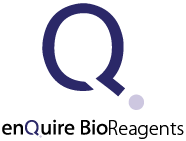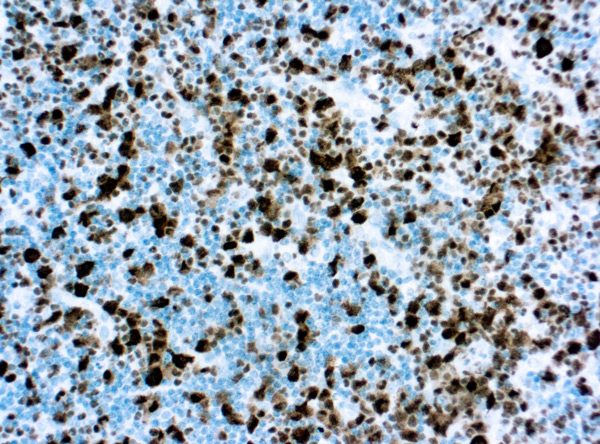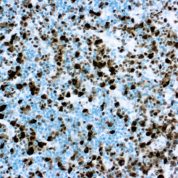Antibody (Suitable for clinical applications)
Sample Type: FFPE Patient Samples.
Tested Applications: IHC. Approved for In Vitro Diagnostic Procedures on FFPE tissues. For tissue collection recommendations, please see datasheet sent with product.
Application Notes
| Specification | Recommendation |
|---|---|
| Recommended Dilution (Conc) | 1:50-1:100 |
| Pretreatment | Citrate Buffer pH 6.0 |
| Incubation Parameters | 30 min at Room Temperature |
Prior to use, inspect vial for the presence of any precipitate or other unusual physical properties. These can indicate that the antibody has degraded and is no longer suitable for patient samples. Please run positive and negative controls simultaneously with all patient samples to account and control for errors in laboratory procedure. Use of methods or materials not recommended by enQuire Bio including change to dilution range and detection system should be routinely validated by the user.
Clonality: Monoclonal
Anti-Anaplastic Lymphoma Kinase Antibody Clone: 4A4
Host and Isotype: Mouse IgG2b
Recommended Positive Control Sample: Anaplastic large cell lymphoma
Cellular Localization of Antibody 4A4 Staining: Cytoplasmic and nuclear staining
Buffer and Stabilizer: PBS with 1% BSA and 0.05% NaN3
Antibody Concentration: Lot specific. Plese contact tech support for data.
Immunogen: Recombinant human ALK protein fragment.
Storage Conditions: This antibody should be stored refrigerated (2-8°C). This product should not be used past the expiration date printed on the vial.
Anaplastic Lymphoma Kinase Information for Pathologists
Summary:
See also NPM-ALK fusion protein. Anaplastic lymphoma kinase gene is at 2p23; protein is called ALK1, CD246. Membrane spanning tyrosine kinase receptor, member of insulin receptor family. Is NOT the same as Ki-1/CD30, contrary to some references. Interpretation: usually cytoplasmic and nuclear staining.Limitations and Warranty
This antibody is manufactured in accordance with clinical good manufacturing practices in an ISO13485:2016 certified production facility. It is intended for multiple uses including in vitro diagnostic use and research use only applications. Please see vial label for expiration date. We strive to always deliver antibodies with a shelf life of at least two years.






There are no reviews yet.